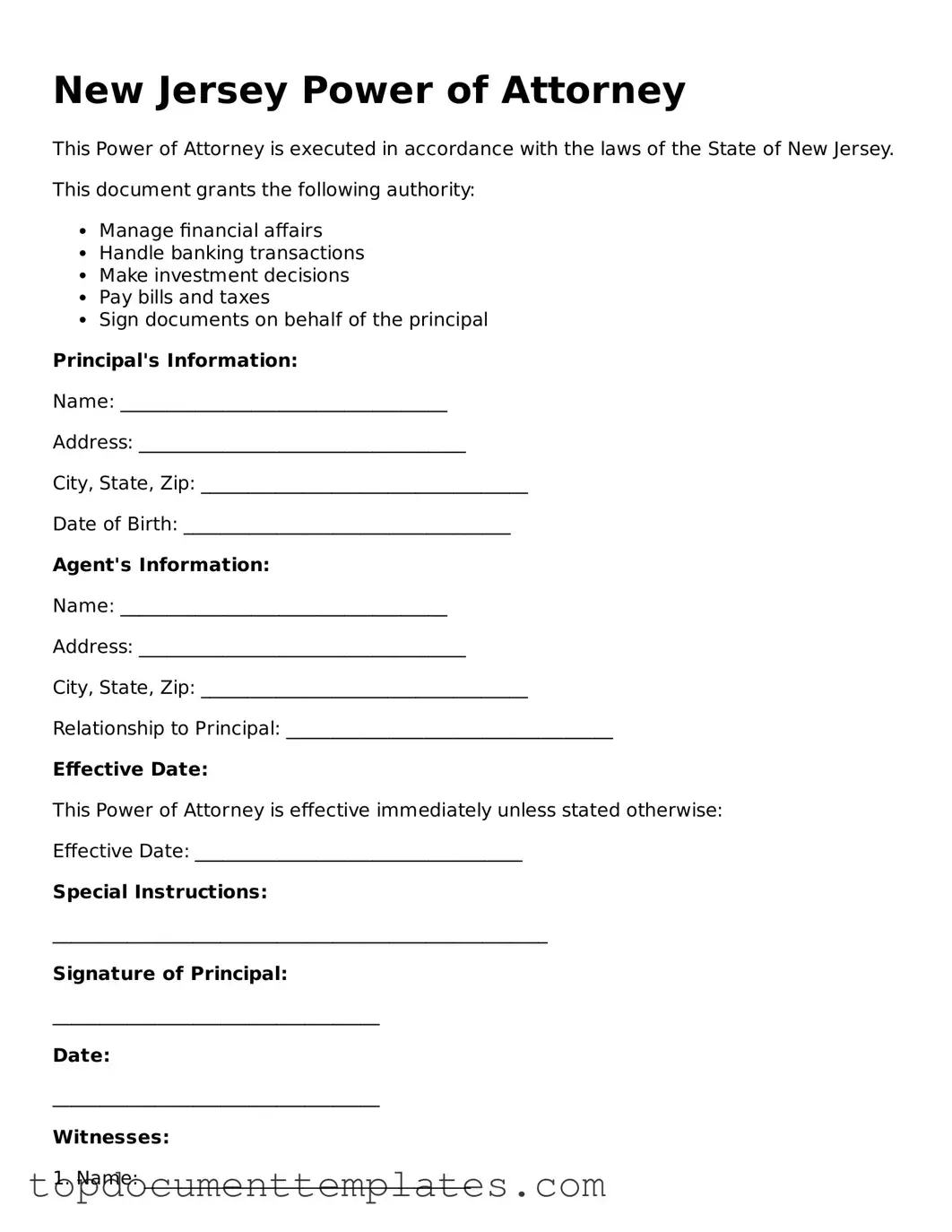Valid Power of Attorney Form for New Jersey State
The New Jersey Power of Attorney form is a crucial legal document that enables individuals to appoint someone else to act on their behalf in various financial and legal matters. This form can be tailored to meet specific needs, allowing the principal—the person granting authority—to define the scope of powers granted to the agent, or attorney-in-fact. Key aspects of the form include the ability to make decisions regarding property, finances, and healthcare, depending on the type of Power of Attorney selected. There are different variations, such as general and limited powers, which can be used based on the principal’s preferences and circumstances. Additionally, the form must be signed and dated in the presence of a notary public or witnesses to ensure its validity. Understanding the implications of this document is essential, as it not only facilitates decision-making in the principal's absence but also carries significant responsibilities for the appointed agent. Properly executing this form can help avoid potential disputes and ensure that the principal's wishes are honored when they are unable to communicate them directly.
Similar forms
-
Living Will: A living will outlines your wishes regarding medical treatment in case you become unable to communicate. Like a Power of Attorney, it allows you to express your preferences, but it specifically focuses on healthcare decisions rather than financial or legal matters.
- Quitclaim Deed: To simplify property transfers between individuals, our informative Quitclaim Deed form guide provides essential insights into its proper use.
-
Health Care Proxy: This document designates someone to make medical decisions on your behalf if you are incapacitated. Similar to a Power of Attorney, a health care proxy empowers another person to act in your best interest, but it is limited to health-related decisions.
-
Durable Power of Attorney: This is a specific type of Power of Attorney that remains effective even if you become incapacitated. Both documents grant authority to someone else, but a durable version ensures that your chosen agent can continue to act on your behalf when you can no longer do so.
-
Financial Power of Attorney: This document gives someone the authority to manage your financial affairs. While a general Power of Attorney can cover various aspects, a financial Power of Attorney focuses specifically on financial matters, allowing your agent to handle bills, investments, and other financial decisions.
-
Trust Agreement: A trust agreement allows you to place your assets in a trust for management by a trustee. Similar to a Power of Attorney, it involves delegating authority, but it typically focuses on asset management and distribution according to your wishes.
Guidelines on Writing New Jersey Power of Attorney
Filling out the New Jersey Power of Attorney form is a straightforward process. This document allows you to appoint someone to make decisions on your behalf. Follow these steps carefully to ensure the form is completed correctly.
- Obtain the New Jersey Power of Attorney form. You can download it from the New Jersey government website or request a copy from a legal office.
- Begin by filling in your name and address at the top of the form. This identifies you as the principal.
- Next, provide the name and address of the person you are appointing as your agent. This individual will have the authority to act on your behalf.
- Specify the powers you wish to grant your agent. This may include financial, medical, or legal decisions. Be clear about what decisions they can make.
- Choose whether the Power of Attorney is effective immediately or if it should only take effect under certain conditions, such as incapacitation.
- Sign and date the form at the designated area. Your signature must match the name you provided at the top.
- Have the form notarized. This step is crucial as it adds legitimacy to the document. Both you and your agent may need to be present during notarization.
- Provide copies of the signed and notarized form to your agent and any relevant institutions, such as banks or healthcare providers.
File Information
| Fact Name | Description |
|---|---|
| Definition | A Power of Attorney (POA) in New Jersey allows one person to give another person the authority to make decisions on their behalf. |
| Types | New Jersey recognizes several types of POA, including General, Limited, Durable, and Medical POA. |
| Governing Law | The New Jersey Power of Attorney is governed by the New Jersey Uniform Power of Attorney Act (N.J.S.A. 46:2B-8 et seq.). |
| Durability | A Durable Power of Attorney remains effective even if the principal becomes incapacitated. |
| Signing Requirements | The form must be signed by the principal and witnessed by at least one person or notarized. |
| Revocation | The principal can revoke a Power of Attorney at any time, as long as they are competent. |
| Healthcare Decisions | A Medical Power of Attorney specifically allows someone to make healthcare decisions for the principal if they are unable to do so. |
Other Popular Power of Attorney State Forms
Iowa Power of Attorney - Ensure your Power of Attorney is signed in the presence of the required witnesses.
How to Get Power of Attorney for Elderly Parent in Georgia - Consulting with a legal professional can help avoid potential pitfalls.
Understanding the complexities of rental agreements is crucial for both landlords and tenants, making resources like the OnlineLawDocs.com invaluable for navigating the specifics of the Florida Lease Agreement form, which serves as a legally binding contract between the two parties.
Power of Attorney Document - Signing the form in front of witnesses creates additional assurance for all parties involved.
